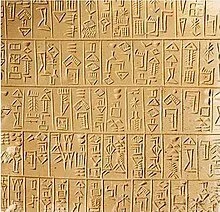Today, I read the “memory overload” section in “Sapiens”, where I learned that the first few generations of the written languages were developed for the purpose of book-keeping. Not for recording down philosephors’ thoughts, not for written romantic letters, not for religious educational purposes — The written languages were developed for accounting and taxation of ancient empires. For a thousand years or more since 3500 BC, those written languages remains partial and were designed to be concise, symbolic, and functional. They were not created to match with the spoken languages, but rather to compliment the disadvantages of the spoken words on scalability and durability.
A few thoughts about this learning:
The written languages were born much later than the spoken languages. For thousands of years, our human beings lived and collaborated on just spoken languages. Therefore, time-wise, our species are more used to express our emotions and build closed, trustful relationship by talking with others face-to-face. This is a very relevant factor at the current remote-working era: it would be naturally difficult to establish new relationships and maintain existing ones without in-person chat; we would tend to be more biased towards people who are physically adjacent to us; the slack messages and emails won’t fully replace the importance of having verbal communications.
On the other hand, the written languages were created for optimal transmission, invariability, and scalability. The leaders of empires wanted to use written words to count how many total resources they and how much wealth they should collect from people; they wanted to use written messages to pass information between places that was thousands of miles apart from each other. The same piece of written message that has been gone through multiple people should still be interpreted in the same way as the original facts. The facts behind those words should be interpreted consistently among hundreds of thousands of people who used the same deciphering methods. Even nowadays, when compared with other mediums like podcasts, videos, and live streaming, the advantages of written pieces should be on its potential to store and transmit a large amount of information in a compact format. As a blog writer, the strength that I can leverage from the written words is to pass useful, accurate, and wealth of facts to a wide range of audiences.
The origin of the written languages reflected that from 5000 years ago, the rulers had been extraordinarily eager to record down the social and economic activities of their population —— so eager that they developed this new tool of data recording helped them to gain more powers and build much bigger empires. This same story happens nowadays. Big technology companies arise and prosper from tracking and processing the information of their billions of users at more granular levels. They create a new kind of empires on the digital space. On the other hand, the governments have been historically motivated to tap on such data to exert more controls and harness more values from their residents as well. They could easily cross the lines if there’s no one protect against that. We as regular citizens would need to carefully protect the lines of how much data these companies and governments can access and exploit for their own interests.
Sumerian language from Mesopotamia in 3000 BC, from Wikipedia

